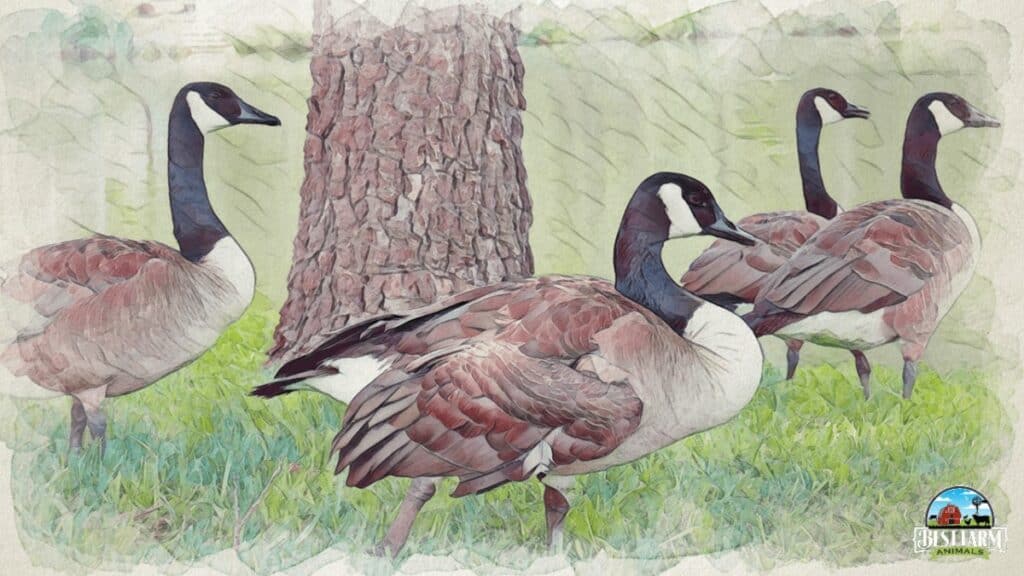When you first think of geese, you don’t think of a quiet goose. Most goose breeds are noisy and loud. I mean, is there such a thing as a silent goose?
Then, I remembered the two Sebastopol geese I’d had for six years. Both of them enjoy roaming around the farm, swimming in ponds, and foraging for vegetation. Although Sebastopol geese are a quieter goose breed, they still enjoy cackling and honking at each other and are swift to sound the alarm bell when they feel threatened.
But, there are ways to make your geese quiet or create less noise. Geese are usually more silent when they feel safe and content. If you don’t have time to train them, better buy your own quiet goose breeds.
What are the quiet goose breeds? The quiet goose breeds are Sebastopol, Tufted Roman, American Buff, Pilgrim, Toulouse, and Embden geese. These goose breeds are usually more laid back and silent and can be kept as pets at home. Sebastopols and Embden geese are popular as backyard pets, while the other silent goose breeds are all friendly to humans. These geese can also be easily trained and don’t usually get loud at night or in the morning.
Compared to these quiet goose breeds, domestic geese can be very loud and vocal when anything new or suspicious enters their environment, making them great security guards. But if you don’t want them to be too noisy, read this article and find out how to keep your geese quiet.
Are There Any Quiet Goose Breeds?
Quiet goose breeds exist, such as Sebastopol, Tufted Roman, American Buff, Pilgrim, Toulouse, and Embden geese. These birds are normally raised as pets at home. Although there are instances that they could still produce loud noises, these goose breeds are the best animal pets you can have, whether for backyard living or even in the city.
6 Quiet Goose Breeds You Should Know
Some quiet goose breeds can silently live with their owners without neighbors complaining about the noise. Here are six of the most silent goose breeds you should know:
1. Sebastopol Geese: Very Shy And Moves Slowly
Sebastopol Geese are naturally docile and quiet geese but would make a noise if they’re not correctly taken care of. These birds are very shy and move slowly, so they don’t usually wander that far from anyone’s home.
Feeding them isn’t an issue since they’re known as good foragers and can easily get fat. This type of goose is a great pet because it’s less aggressive than other geese. Sebastopol geese are easy to identify with their scruffy white feathers, which is why they’re also named “unkempt geese.”
Make sure you feed your goose waterfowl feed (on Amazon) as they have different needs than chickens.
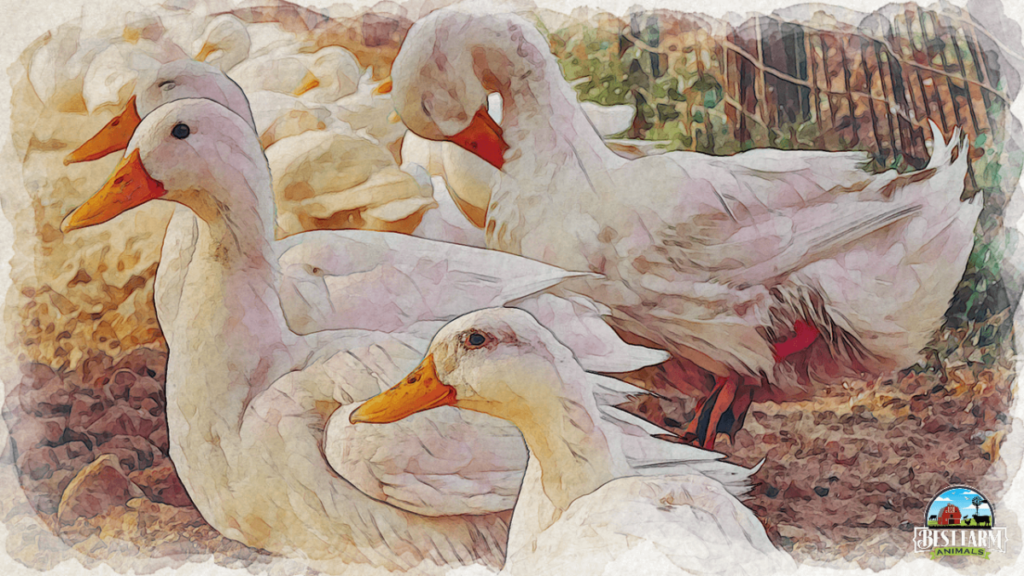
2. The American Buff: Gentle And Quiet As Pets at Home
American Buff Geese are very gentle and quiet, which makes them great pets. Surprisingly, these geese don’t quack when they’re communicating with people or other geese, making them calmer than other goose breeds.
It is also one of the prettiest goose breeds out there because of its orange feet and bills with soft tan or apricot-colored feathers. They’re also the largest medium-sized goose breeds, which makes them more eye-catching.
3. Pilgrim Geese: Friendly And Silent Birds
The Pilgrim is a quiet goose that tends to be friendlier than other types of geese. This breed, however, makes noise once they see an intruder since they have excellent vision. Usually, they will honk or hiss at a person, so it’s better to leave them alone to reduce their noise.
Female Pilgrims are said to be quieter than males. The females have predominantly gray feathers, while males have mostly white feathers with tufts of gray near their tails and wings.
4. Toulouse Geese: Quiet And They Don’t Fight Other Animals
Toulouse Geese are quiet and placid birds that don’t usually get over-excited. They don’t normally show aggression, even towards other animals like chickens or ducks. In fact, ducks and geese can even be neighbors.
On some occasions, the Toulouse males can get very loud, protective, and territorial, especially during the breeding season. Be careful putting Toulouse geese with other goose breeds because they might upset these quiet geese. These birds also like to swim outside or stay inside their home.
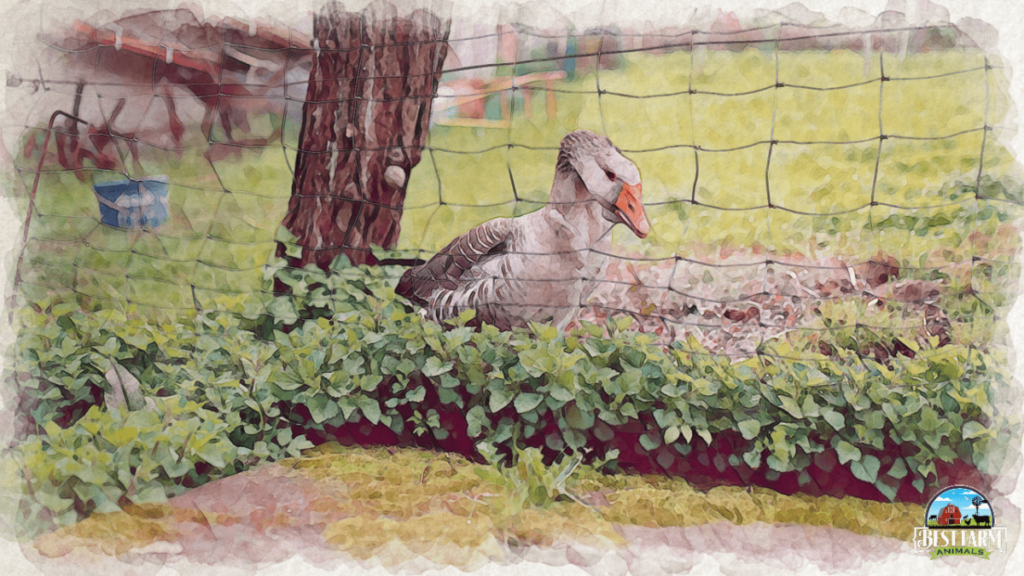
5. Tufted Roman Geese: Not Usually Loud And Are Great Parents
Tufted Roman geese can be quiet and noisy. This goose breed is normally silent but can produce a loud noise when feeling excited— whether due to treats or new toys. Tufted Roman geese are also docile and kept as pets at home because of their friendly nature to humans.
Aside from that, this silent goose breed is also very active and are great parent to their goslings.
6. Embden (Emden) Geese: Quietest Guard Goose
Embden goose is considered the quietest guard goose because it’s larger in size than other silent goose breeds. This also makes them a great choice as home or farm pets.
The male Embden geese can produce loud noise to show dominance and protect other geese. They do this to show that they’re very protective of their females and young.
These pure white-feathered geese are one of the most common goose breeds in the United States because they’re raised for meat production. Taking care of them is almost effortless, but don’t feed them too much since they can easily get fat.
Why Are My Geese So Loud?
Geese are loud to defend their territory and protect themselves from possible predators roaming around. They produce noises to keep their flock together and signal them against any danger. Most of the time, goslings tend to wander off, so older geese need to tell them where to go.
Another reason geese are noisy is to let other geese stay in their lane, especially when they fly together. On some occasions, geese fly at night or in bad weather, so the leader goose in front has to alert everyone of possible obstacles ahead.
It’s common to hear geese honking at night because that is the time they mate with female geese. They also produce more noise when it’s dark to protect their flock from possible predators lurking around. In the morning, geese can also get very loud to claim their territory and warn predators.
Why Geese Make So Much Noise
- To navigate when flying
- To protect their flock from predators
- To alert flock from possible dangers
- To defend territory
- To mate
What Kind of Sound Do Geese Make?
Geese make sounds like a honk, a brood call, an alarm call, a cackle, and a hiss. They make these common sounds every day, and it’s how they naturally communicate. Each sound has a different message, so you must understand what these sounds mean when owning geese.
Goose Honk to Call Other Geese
Honking is a low-pitched, persistent sound that geese use to communicate with each other and call other geese. This sound is used in many different situations, such as encouraging each other to move faster or calling for a goose that has wandered too far. It’s described as a goose’s default noise.
Cackle Sound of Geese Means A Greeting Call
When a goose cackles, it’ll sound like a laughing goose, which means greetings for geese. This is their normal way to greet their fellow geese, usually during mating season.
Both the gander and dame geese make this cackling sound, which they can produce because of their high-pitched voice. Since it’s quite similar to an alarm call, cackle sounds can be confusing for owners to hear for the first time.
Mother Goose Murmurs A Brood Call to Gather Goslings
A brood call is a murmuring sound only used by mother geese when they call their goslings. You can hear this when she guides them to come with her somewhere else. Just like human parents, geese are very protective of their offspring. If the mother goose senses you near her goslings, she might get defensive toward you.
Geese Hiss to Warn You to Stay Away or If A Predator’s Nearby
Whenever you hear a goose hissing at you like a cat, stay away because it represents a warning call. Geese normally produce a hissing sound when they feel in danger or they’re near a predator. This is their way of asserting dominance against geese, animals, or humans. Besides the hissing sound, geese will flap their wings and swing their necks to appear big.
Goose’s Alarm Call Means There’s Danger Ahead
An alarm call is a loud shrieking sound that warns other geese about an incoming threat or predator. This call means the flock is in danger. Once they hear this, it’s their signal to gather around— no ifs and buts. After that, they’ll prepare to flee the area to stay away from any possible danger.
How Do You Keep Geese Quiet?
You can have a silent goose in many ways, like bringing down its flock size, keeping them busy, and giving them a safe and secure environment. This way, they will feel calm, protected, and away from predators. Remember, geese normally communicate through sound, so it’s nearly impossible to silence a goose for long periods.
However, it is possible to reduce the amount of calling and noises they make during the day (when they are most chatty)
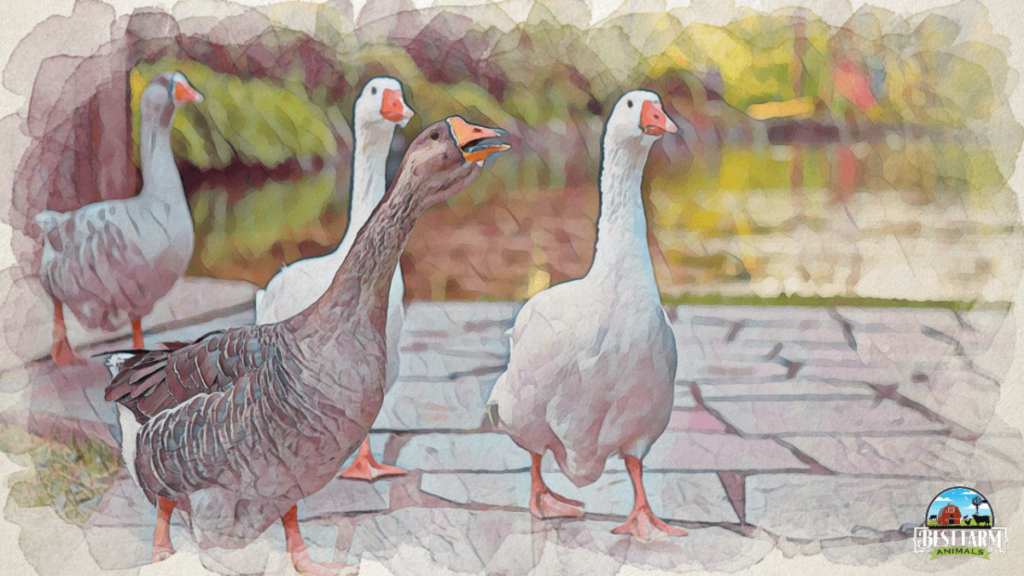
4 Steps to Make Your Geese Quieter
It is possible to have a quiet goose by limiting its number in a flock, giving a spacious cage for it, or by keeping it entertained at all times. Geese communicate through sound, some goose breeds more than others, and it is somewhat impossible to silence a goose for long periods.
However, you can still do many tricks to reduce the amount of calling and noises they make during the day (when they are most chatty). Check the steps below.
1. Limit The Number Of Geese In A Flock to Minimize Noise
The more geese you have, the more noise they’ll make, so make sure to limit the number of geese in a single flock. A large flock of geese always calls for each other, so having a smaller flock will reduce the loud honking and cackling. You may also find limiting your flock to females to minimize noise, as male geese tend to cackle louder than females during mating season.
2. Have A Predator-Free Environment for Geese
Ensure your geese are in a safe and predator-free environment, as this will reduce the number of times they sound that shrieking loud alarm call. Geese are very territorial and protective. They will sound the alarm call as soon as something threatening enters their space, whether it’s a predator animal or, even worse, a different species of bird threatening to eat their vegetation.
3. Allot A Spacious Cage for Geese To Let Them Roam
A spacious environment allows geese to explore, roam, wander, and exercise. Geese enjoy roaming, so they can get loud when confined to one area for long periods. The recommended space requirement for a single goose ranges from 6 to 8 square feet of area. Make sure to keep their cage with proper ventilation to avoid them making loud noises.
4. Make a Fun Environment for Geese To Avoid Boredom
Geese must have a fun environment where they have plenty of vegetation and space to avoid getting bored; otherwise, they’ll make a noise. Geese are easy to care for each day, and their environment plays a huge part in their silent goose behavior.
Some geese thoroughly enjoy playing with dog toys and bells, as it keeps them amused and, for the most part, keeps them quiet for a while.
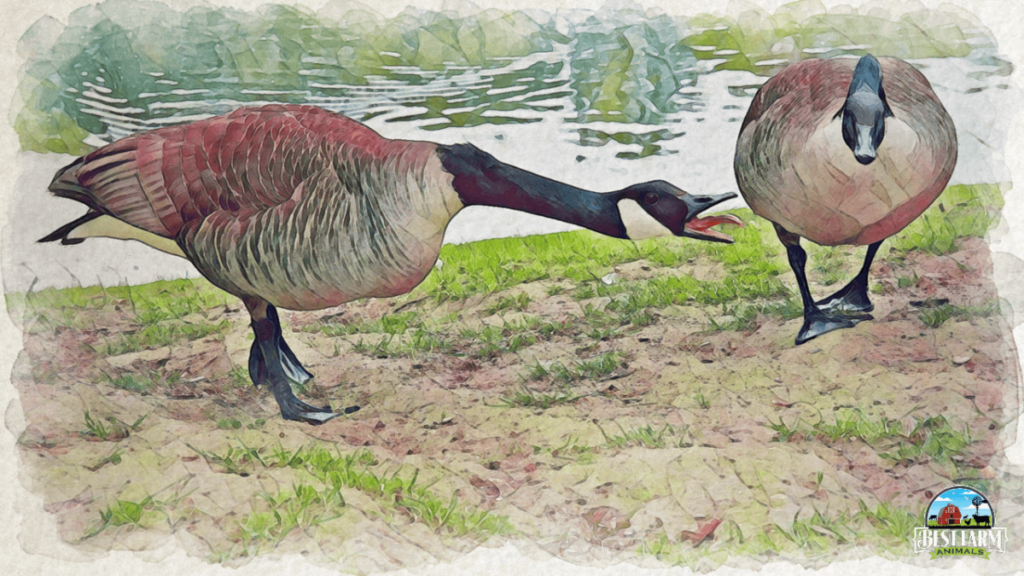
Quiet Goose Breeds FAQs
There are several quiet goose breeds to choose from. But, be aware of the different breeds before buying. If you have no budget, pick a domestic goose and try to train it to be quieter.
Why Do Geese Get Loud At Night?
While geese mostly sleep at night, they can get exceptionally loud for many reasons. Most geese need to get noisy to defend their territory, protect themselves from predators, and keep the flock together, so one doesn’t wander off. Geese also mate at night, making them noisier than usual during the breeding season.
Are Geese Social?
Geese can be very friendly when socialized with other birds, animals, and even humans. This is especially true when they are raised in an environment where they mingle with others. Geese can form groups of friends that are called gaggles.
A goose is protective of those in its group and has the instinct to take turns looking out for the group. They only like to be alone with themselves when they’re nesting.
Do Geese Make Partners For Life?
Geese are incredibly loyal creatures; they mate for life and can be very protective over their partners. Geese tend to bond with their partners as early as 2 years of age but usually do so when they’re 3-4 years old. Apart from their life partners, they are also protective of their goslings.
Geese can also experience mourning and grief when they lose their partners. The death of their partner may affect them terribly, and they’ll never mate again. Some geese breeds, however, immediately find another partner within the same breeding season.
How Can You Tell If A Goose Is Male Or Female?
Female geese have pointed tail feathers while males have rounded tail feathers. However, the most accurate way to tell their gender is by flipping them to see their belly. A gander’s genitalia can easily be seen. In addition, a dame usually likes to stay in the background, is less vocal, and smaller in size. A gander is larger and is vocal and loud.
By understanding their behavior, you can often also tell the differences between male and female geese. A goose (female), also known as a dame, usually likes to stay in the background, and they’re less vocal and smaller in size. Their necks are also shorter, and they usually suffer from feather loss when mating season because the males bite their heads.
A gander (male) goose is larger and tends to be very vocal and loud. Ganders have high-pitch voices and tend to move their heads like snakes. If you see a goose trying to bite you, it’s more likely a gander.
How Long Do Geese Live?
The average lifespan among goose species is 10 to 20 years. Wild geese can live up to 20 years, and Canadian geese have the most extended lifespan of all the goose breeds. Consider this before you get a goose but remember that they can live very long lives if they’re well cared for.
Conclusion
Geese can make great pets. They’re easy to care for, understand, and make exceptional security guards at night. Ensuring you have the right environment for them will keep your geese happy and content and, most importantly, become a quiet goose.
Before you start your goose community, pay attention to what goose breed suits your environment best. It’s also essential to ensure your community regulations allow you to have geese or check the local hunting laws so they don’t end up in a local hunter’s pot.
Resources:
Vassar
Pub Med

